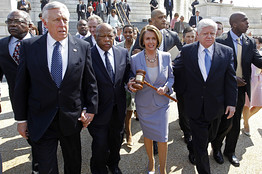Democrats at the Edge of the Cliff
Democrats are spending trillions at the worst possible moment, with a new poll showing public trust in government at a historic low of 22%.
By Dan Henninger
WSJ.com
There was always something eerie about the way the Democrats said their health-care legislation was what the American people had waited "70 years" for. Invoking the ghosts of 1939 was kind of creepy. Then when the moment in history finally arrived, history got no votes from the other party. Whatever the politics, there was something ominous about all this. One felt something else was going on.
A Pew Research Center report just out, the one that says trust in government is at an "historic low" of only 22%, looks like the something else.
Dig past the headline of the Pew study and one discovers why Bill Clinton is insinuating that "demonizing" government could cause another Oklahoma City bombing. If these numbers are at all close to reality, something one can hardly doubt just now, the American people have issued a no-confidence vote in government, at both the national and state level. To the extent one believes in the "consent of the governed," consent is being eroded.
This report isn't bad news for the Democrats. It's Armageddon.
The survey compares views sampled in 1997 with now. The "now" is the Democrats' problem. The survey took place this mid-March. After one year of the charismatic, ever-present Barack Obama, after passage of the party's totemic health-care bill, after spending zillions on Keynesian pump-priming, the American people—well beyond the tea partiers—have the lowest opinion ever of national government.
A year ago, 54% said government should exert more control over the economy; a year later it's 40%.
Some 58% say Uncle Sam is interfering too much in state and local affairs; 53% want "very major reform" of the federal government. After health care passed in March, Pew re-sampled in early April: Trust in government rose—to 25% from 22%. Inspector Clouseau would call that a "bmp."
Pew concludes: "A desire for smaller government is particularly evident since Barack Obama took office." That's pin-the-tail-on-the-donkey without blindfolds.
Democrats could cite one passage in Pew to mitigate this dire portrait. Historically, the report notes, whichever incumbent party is standing next to a big disaster gets pulled down in the undertow. Thus Bush and the Iraq war and Katrina. They can argue that Mr. Obama and the Democrats are getting hit with the legacy of the Bush downdraft and the after-shocks of the financial meltdown of September 2008. Once that passes, and after the inevitable November losses, the economy will stabilize and by 2012 the playing field will reset to normal.
![[wl0422]](../images/ED-AL386_wl0422_NS_20100421193359.gif)
I don't buy this. Something unique happened in the first Obama year, about the last thing the Democratic Party needed: The veil was ripped from the true cost of government. This is the ghastly nightmare Democrats have always needed to keep locked in a crypt.
Before the Internet, that was easy. Washington, California, New York, New Jersey—who knew what the pols were spending? The Democrats (and their Republican pilot fish) could get away with this. Not now. Email lists, 24/7 newspapers, blogs, TV and talk radio—the spending beast is running naked.
When the financial crisis piled in atop a recession, the Democrats' academic/pundit economists blandly convinced the party to wave a $787 billion stimulus at the problem in early 2009. Then, on April 30, the Democrats passed an FY 2010 budget of $3.5 trillion. This year the FY 2011 budget hit $3.8 trillion, reaching a post-World War II high of 25% of GDP. In March, they passed the trillion-dollar health-care bill. Total headline spending commitments in one year: about $9 trillion. That's a lot of "trust" to ask for during a recession with 9% unemployment. And now a sense is building of some broad middle-class tax grab. After soaking the rich, comes the deluge.
Demonization? No need. They did it to themselves.
Barack Obama's speeches are filled with the Democrats' core claim to legitimacy: Government must and will do good. It must "act." But in a crucial period when voters across the political spectrum were losing faith in that core claim, the Democrats lost any self-protective sense of what they were doing with public budgets. Barack Obama took a rising reservoir of public trust for his party (62% said they liked the Democrats in January 2009), and emptied it. Since he took office, the percentage of people who want smaller government and fewer services has risen, to 50% from 42%.
A Quinnipiac poll released yesterday has the Obama presidential approval rating down to 44%—after health care, after the arms treaty with Russia, after the 47-nation, anti-proliferation convocation in Washington.
He insists on more government. People want less, and don't trust what they've got. They want reform. Here's the Pew blowout data:
In 1994 when the Democrats lost over 50 House seats at mid-term, the party's favorable rating was 62%, and for the Congress they controlled it was 53%. They still got killed. Now the party's favorable is 38% and Congress's approval is 25%. The Republicans' numbers are low, too, but they're not in charge.
The Democratic Party is on the edge of an electoral cliff with a long fall to the bottom. No wonder they're seeing a demon under every bed.
Write to henninger@wsj.com
